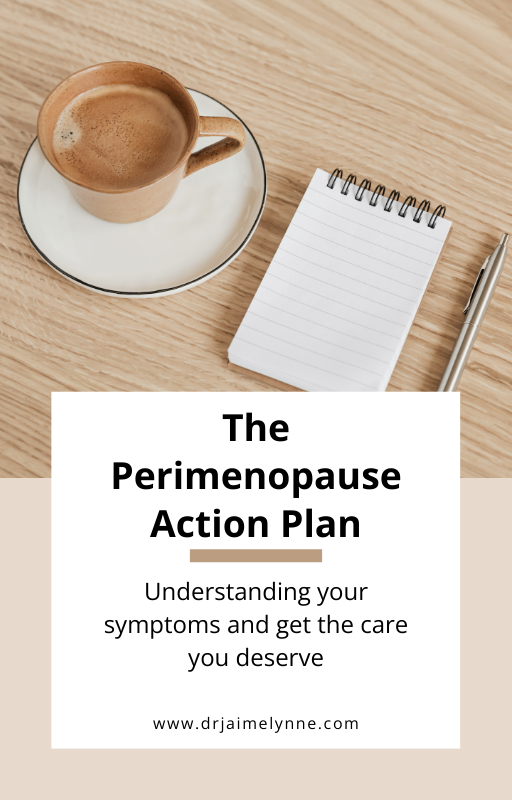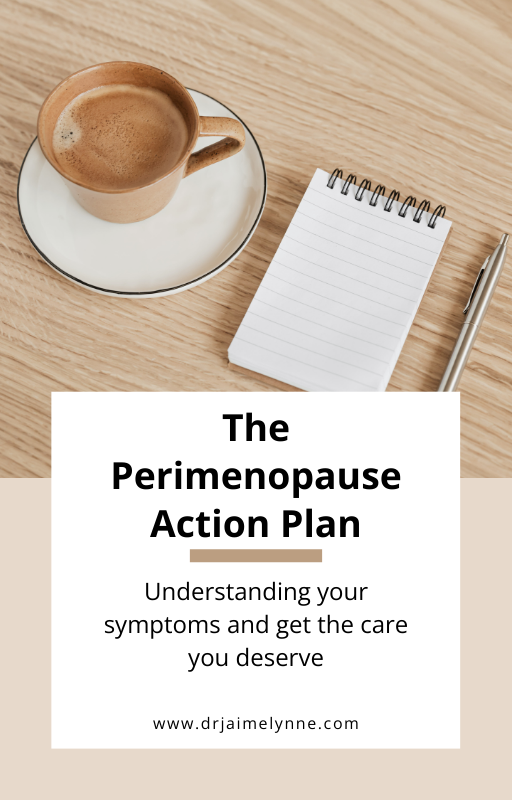7 Things Every Woman Should Be Doing in Perimenopause
7 Things Every Women Should Be Doing During Perimenopause
In this post, you’ll learn the seven evidence-based habits that help reduce perimenopause symptoms like weight gain, mood swings, insomnia, and low energy and why they actually work.
If you’ve been googling “Why do I feel different in my 40s?” or “Is this perimenopause?” you’re not imagining it.
Your body can start responding differently years before your period stops, sleep changes, mood shifts, weight redistributes, and your energy feels unpredictable.
That was me at 46. I started crying for no reason, losing my resilience, and reacting to things that never used to bother me.
Years earlier, I had signs I didn’t recognize, night sweats in my early 40s, insomnia before my period, waves of sadness at the end of my cycle.
My GYN prescribed an antidepressant. No conversation about hormones. No explanation of why this was happening. But everything I was feeling had a root cause: hormonal fluctuations that begin during perimenopause.
Understanding that changed everything. It gave me clarity, direction, and my confidence back.
If you're here because your body suddenly feels different and no one has connected the dots for you yet, this is where you start.
If you’re not sure which of these seven areas your body needs most right now, take my 2-minute quiz and get a personalized starting point. It’s the fastest way to understand your symptom pattern and what to prioritize first.
Once you have clarity on your symptom pattern, the next step is building habits that actually support your hormones.
These seven evidence-based foundations are where every woman in perimenopause should start, regardless of whether your biggest struggle is sleep, weight gain, mood changes, or low energy.
1. Eat More Protein
Why does protein matter so much in perimenopause?
Estrogen plays a major role in maintaining muscle mass, metabolism, and blood sugar stability. As estrogen fluctuates, your protein needs increase and most women don’t eat enough to compensate. This is why fatigue, cravings, and stubborn weight gain (especially belly fat) become more noticeable during perimenopause.
How to support your hormones naturally:
Aim for 25–30 grams of protein per meal
Choose eggs, Greek yogurt, tofu, beans, lean meats, or protein powders
Prioritize protein at breakfast to prevent blood sugar crashes
2. Strength Train 3–4 Days a Week
Why is strength training essential during perimenopause?
Muscle and bone density decline faster as estrogen drops. Strength training is the only proven way to counter this. It boosts metabolism, improves insulin sensitivity, and reduces many common perimenopause symptoms like fatigue, anxiety, and weight changes.
How to support your body:
Use dumbbells, resistance bands, or bodyweight
Focus on squats, lunges, pushups, deadlifts
Increase resistance gradually to protect muscles and bones
3. Balance Your Blood Sugar
Why does blood sugar matter so much now?
Fluctuating estrogen and progesterone make your body more sensitive to glucose spikes. High or unstable blood sugar worsens hot flashes, brain fog, irritability, cravings, fatigue, and midsection weight gain.
How to support your body:
Pair carbs with protein and healthy fats
Avoid skipping meals, it spikes cortisol
Reduce sugar, processed foods, and alcohol
Focus on whole foods, fiber, veggies, healthy fats
4. Prioritize Sleep Like It’s Medicine
Why does perimenopause impact sleep so much?
Fluctuating estrogen and progesterone affect melatonin, cortisol, and temperature regulation. This is why so many women experience the classic 3 a.m. wakeups, night sweats, and restless sleep during perimenopause.
How to improve sleep during perimenopause:
Keep your room cool and dark
Limit screens before bed
Ask your provider about magnesium glycinate
Avoid alcohol, it worsens night sweats and sleep quality
Struggling specifically with 3 a.m. wakeups? Read this next: Why Perimenopause wrecks your sleep and what you can do about it.
5. Reduce Stress to Lower Cortisol
Why does stress hit harder during perimenopause?
Estrogen helps buffer cortisol. When estrogen fluctuates, stress impacts your body more intensely leading to anxiety, irritability, weight gain, inflammation, and sleep disruption.
How to support your nervous system:
Take daily outdoor walks
Do breathwork, meditation, or grounding exercises
Set strong boundaries
Include restorative movement like yoga or stretching
6. Advocate for Yourself at Every Appointment
Why is self-advocacy so important now?
Perimenopause is diagnosed by symptoms, not a single lab test. Many women are told they’re “too young” or “fine” even when they’re experiencing classic signs of hormone imbalance.
Use my free Perimenopause Action Plan to:
Track symptoms and hormonal patterns
Identify triggers (like caffeine, stress, or cycle changes)
Prepare clear questions for your doctor
Walk into appointments informed, confident, and prepared
You don’t have to accept “You’re fine” as an answer when you know you’re not. Perimenopause is real, even when your labs look “normal.”
7. Build Community & Stay Connected
Why does connection matter during perimenopause?
Women in their 40s and 50s often feel isolated in their symptoms even though millions are searching the same questions online. Connection lowers cortisol, increases resilience, and reminds you that what you’re feeling is normal and valid.
Ways to build support:
Talk honestly with trusted friends
Join supportive women’s wellness groups (online or in person) where perimenopause conversations are welcomed, not dismissed.
Sign up for my newsletter at DrJaimeLynne.com for weekly hormone tips, science-based strategies, and encouragement
Final Thoughts
Perimenopause feels overwhelming when it feels unpredictable. It becomes manageable when you understand what your body is responding to.
These seven habits are not trends. They are foundational physiological supports for a body navigating hormonal change.
Start small. Start consistently. And build from there.
Your next steps:
Your Next Step:
→ Take the 2-minute quiz to identify your dominant symptom pattern
→ Download the Perimenopause Action Plan before your next appointment
→ Or explore more here: Perimenopause Symptoms Explained
Your body isn’t failing, it’s communicating.
Now you have the tools to understand it.
Hi I’m Dr. Jaime Lynne
A women’s health advocate and educator passionate about helping women navigate the confusing and often overlooked journey of Perimenopause. I empower women to recognize their symptoms, speak up, and get the care they deserve.
Perimenopause and Weight Gain: Why It Happens and What You Can Do About It
Perimenopause and Weight Gain: Why it happens and what you can do about it
Let’s be honest: perimenopause weight gain feels like betrayal.
You’re doing everything “right” eating clean, working out, watching portions and the scale still climbs.
Not just anywhere. Belly. Back. Upper arms.
I’ve lived this.
If you’re not even sure whether what you’re experiencing is perimenopause or something else, start here: Take my 2-minute Perimenopause Quiz and get a personalized starting point.
I was a long-time Weight Watchers user. I meal prepped, tracked points religiously, and ran several times a week. That system worked well for years until I hit 46. Then suddenly, my body stopped responding. I didn’t change anything, but I started gaining. Fast. Ten pounds, plus bloating, belly fat, and a deep frustration that nothing was working the way it used to.
When I brought this up at the doctor’s office, the answer I got was: “You can be doing everything right and still gain weight at this age.” And while that might technically be true…it felt dismissive. It felt hopeless.
I’m not someone who likes to give up without understanding why. So I started digging. Here’s what I found and what’s been helping me (and the women I work with).
Why Weight Gain Happens in Perimenopause
Hormonal shifts are the root issue. Estrogen, progesterone, and testosterone all fluctuate and decline during this transition. These changes affect nearly every metabolic system:
Estrogen regulates fat distribution. As levels drop, fat shifts from hips/thighs to the belly (hello, muffin top).
Progesterone helps regulate fluid and inflammation. Lower levels = more bloating, water retention, and joint stiffness.
Testosterone supports muscle mass. Less testosterone = faster muscle loss → slower metabolism.
Cortisol (stress hormone) spikes with poor sleep and hot flashes, which drives fat storage, especially around the belly.
Insulin resistance becomes more common, so your cells are less efficient at processing carbs. Even “healthy” meals may get stored as fat more easily.
👉 Translation: what worked in your 30s no longer cuts it. You’re not failing, your body is operating on a completely different hormonal playing field.
What Can You Do? (What’s Helping Me So Far)
1. Increase Protein—Way More Than You Think
I used to think 50–60g a day was plenty. Now I aim for 100–120g spread across meals.
Why?
Protein is thermogenic (burns more calories to digest).
Supports lean muscle, which keeps metabolism humming.
Helps regulate blood sugar and curb cravings.
Example: I start with a 30g protein smoothie (collagen, chia, almond butter), then build meals around chicken, fish, turkey, beans, or eggs. A protein powder has been key to hitting my numbers.
2. Lift Heavy—Not Just “Tone”
For years, I leaned on cardio. But in perimenopause, endless running raises cortisol and eats away muscle.
Now I strength train 3–4 times/week, focusing on progressive overload:
Squats
Deadlifts
Rows
Presses
Weighted core work
This isn’t about “bulking up.” It’s about rebuilding muscle for metabolism, blood sugar control, posture, and energy. Creatine (3–5g/day, cleared with your doctor) has helped me preserve strength and recovery.
3. Manage Blood Sugar Like It’s a Job
I never realized how much energy crashes and cravings were tied to blood sugar. Now I:
Pair carbs with protein/fat/fiber.
Avoid eating refined carbs alone (fruit by itself → quick crash).
Eat within 1–2 hours of waking.
Don’t skip meals (spikes cortisol and overeating later).
Balanced meals = stable energy and fewer cravings. Think: salmon bowl with brown rice and avocado vs. a “diet” frozen meal.
If you want the full picture beyond blood sugar alone, read this next:
👉 7 Things Every Woman Should Be Doing in Perimenopause
Weight gain is rarely just one lever. It’s sleep, strength training, protein, stress, and hormone shifts working together.
4. Sleep: The Unsung Weight-Loss Tool
I used to treat sleep as optional. Big mistake. Poor sleep = more ghrelin (hunger hormone), less leptin (satiety hormone), and elevated cortisol (belly fat). Translation? You will crave more carbs the next day. And your body will store more around your midsection. Sleep isn’t optional in perimenopause. It’s metabolic.
What’s worked:
Magnesium glycinate before bed.
Dark, cool room.
Blue-light glasses at night.
Waking at the same time daily even weekends.
Better sleep has made every other strategy more effective.
If waking at 3am is your thing right now, read:
Why Perimenopause wrecks your sleep and what you can do about it.
5. Track Differently (Not Just the Scale)
The scale used to crush me. Now I measure progress differently:
Protein intake
Weekly workouts
Strength increases (heavier weights, more reps)
Energy levels
How my clothes fit
This mindset shift keeps me motivated when the number doesn’t budge. If you only track the scale, you’ll miss muscle gain, improved insulin sensitivity, and real metabolic change. Progress in perimenopause is quieter, but it’s real.
6. Advocate for Yourself With Your Doctor
This one’s huge. Many providers dismiss weight gain as “just aging.” But you have the right to answers. Bring:
Symptom logs (mood, sleep, energy, cycle).
Questions about thyroid, insulin resistance, or hormones.
A willingness to push back or find a new provider.
If you’ve been dismissed or told this is “just aging,” don’t go back empty-handed. Download the Perimenopause Action Plan it includes symptom trackers, lab conversation starters, and doctor-ready questions.
What About GLP-1 Medications?
Many women are curious about GLP-1 meds (Ozempic, Wegovy, etc.). Here’s what you need to know:
Pros:
Proven weight loss support.
Helps control appetite and blood sugar.
Cons:
Expensive, often not covered.
Side effects: nausea, GI issues, possible muscle loss.
Long-term use still being studied.
👉 They can be a tool, but they’re not a substitute for nutrition, strength, and lifestyle. Always consult your doctor before considering them.
If you want a step-by-step way to approach weight gain in perimenopause not just random tips, join my weekly emails. I break this down simply, clearly, and without fluff.
You’re Not Doing It Wrong—Your Body Just Needs Something New
Perimenopause weight gain isn’t about willpower. It’s about shifting hormones, insulin sensitivity, sleep disruption, and muscle loss.
The rules changed. That doesn’t mean you failed.
If you’re ready to approach this strategically instead of emotionally, start here:
👉 Download the Perimenopause Action Plan.
It includes:
A symptom tracker
Lab conversation starters
Doctor-ready questions
A simple framework for what to prioritize first
Go in prepared.
Stop guessing.
Start advocating.
Hi, I’m Dr. Jaime Lynne,
A women’s health advocate and educator passionate about helping women navigate the confusing and often overlooked journey of perimenopause. Through my work and resources, I empower women to recognize their symptoms, speak up, and get the care they deserve.
Mental Health Changes in Perimenopause
Mental health changes in perimenopause are common but often overlooked. Learn why anxiety, brain fog, irritability, and low motivation can be early signs of hormonal shifts and what steps to take next.
Why Anxiety, Brain Fog, and Mood Swings Are Often the First Signs
For many women, anxiety, irritability, brain fog, and low motivation are some of the earliest signs of perimenopause, often showing up years before hot flashes or missed periods.”
When women think of perimenopause, they picture hot flashes and skipped cycles. What they don’t expect are the quiet emotional and cognitive shifts that often come first.
Feeling more anxious than usual.
Snapping at people you love.
Crying unexpectedly.
Making mountains out of molehills.
Feeling distracted or unable to focus.
Losing motivation for things that once energized you.
These changes can start subtly until one day you realize something feels different. Let’s talk about why this happens and why so many women are misdiagnosed or dismissed during this phase.
Are Mental Health Changes Really a Sign of Perimenopause?
Yes, and they’re incredibly common.
Perimenopause is not just a reproductive transition. It’s a neurological one. Estrogen and progesterone influence serotonin, dopamine, and GABA the brain chemicals that regulate mood, focus, stress tolerance, and emotional resilience.
When these hormones fluctuate (and they fluctuate unpredictably in perimenopause), your brain feels it.
This can show up as:
new or worsening anxiety
irritability
emotional sensitivity
low mood
difficulty focusing
ADHD-like symptoms in your 40s
brain fog
social withdrawal
And because these changes often happen before physical symptoms, many women never connect them to hormones.
Why Do Hormone Fluctuations Affect the Brain So Strongly?
Estrogen plays a critical role in serotonin and dopamine regulation the very systems that stabilize mood and motivation.
When estrogen spikes and dips:
serotonin signaling shifts
dopamine becomes less consistent
cortisol (your stress hormone) becomes more reactive
sleep quality declines
emotional regulation feels harder
Progesterone also matters. It has a calming effect on the brain by supporting GABA. When progesterone drops, which often happens earlier in perimenopause, many women feel more anxious, overstimulated, or emotionally reactive.
This is why women often say:
“I don’t feel like myself.”
“I used to handle stress better.”
“I feel thinner-skinned.”
This isn’t weakness. It’s neurobiology.
Why Are Women Often Labeled Instead of Evaluated Holistically?
Because perimenopause is frequently overlooked.
When a woman in her mid-40s says, “I’ve been feeling anxious lately,”
the conversation often centers on anxiety, not hormones.
That was my experience.
At 46, I found myself crying for no reason, feeling irritable and withdrawn. I had never struggled with mental health issues before. When I brought it up to my GYN, I was handed a prescription for an antidepressant and told to find a good therapist as I was walking out the door.
Let me be clear: medication can absolutely be appropriate and life-changing. That is not the issue.
The issue is when fluctuating hormones aren’t even considered.
Too often, women are:
diagnosed with anxiety for the first time in midlife
labeled with ADHD in their late 40s
told it’s stress
told it’s aging
told their labs are “normal”
Meanwhile, perimenopause is driving many of the symptoms.
It’s Not Always Easy to Know What Your Body Needs
This is where things get confusing.
Some women need stress support.
Some need sleep regulation.
Some need progesterone.
Some need therapy.
Some need hormone therapy.
Many need a combination.
It’s not always obvious what your starting point should be, especially when symptoms overlap.
If you’re unsure where to begin, taking my quiz below “What Support Does My Body Need in Perimenopause?” can be a helpful first step. It won’t diagnose you, but it will give you direction so you’re not trying to fix everything at once.
Clarity reduces overwhelm.
Can Addressing Hormones Improve Mental Health Symptoms?
For many women, yes.
When hormonal fluctuations are supported, whether through lifestyle changes, progesterone therapy, hormone replacement (for appropriate candidates), or stress regulation, mental health symptoms often lessen significantly.
That doesn’t mean hormones are always the only answer. It means they are often a missing piece of the conversation.
How Should I Talk to My Doctor About This?
This is where preparation matters.
Instead of saying, “I feel anxious,” try sharing:
when symptoms started
how they fluctuate through the month
how they impact your daily life
whether they worsen before your period
what other perimenopause symptoms you’re experiencing
Bringing patterns makes it easier for providers to see the hormonal connection.
This is exactly why I created the Perimenopause Action Plan.
It helps you:
understand what’s happening hormonally
track symptoms clearly
prepare for appointments
know what to say if you feel dismissed
Walking into an appointment informed changes the tone of the entire conversation.
Why Are These Changes So Subtle at First?
Because perimenopause isn’t a switch, it’s a gradual hormonal shift that can last years.
It might start with:
feeling more emotionally reactive
being easily overwhelmed
struggling to focus
crying during commercials
withdrawing socially
feeling like small problems feel bigger than they should
These are often the first signs, long before hot flashes ever appear.
Next Steps:
If this resonates with you:
Observe patterns without judgment.
Take the quiz to find your starting point.
Download the Perimenopause Action Plan to prepare for your appointment.
Have a real conversation with your provider even if you’ve been dismissed before.
Mental health changes in midlife are common and often hormonal.
Once you understand that, everything begins to make more sense.
Hi, I’m Dr. Jaime Lynne
A women’s health advocate and educator passionate about helping women navigate the confusing and often overlooked journey of perimenopause.
Download your Free Perimenopause Action Plan!
How to Support Yourself During Perimenopause
Learn how to support your body during perimenopause with science-backed strategies for hormones, sleep, weight, movement, supplements, and symptom relief.
What Actually Helps and Why
There is no one-size-fits-all way to support yourself in perimenopause because every woman’s hormone patterns, symptoms, and stress load are different.
But there are evidence-based approaches that consistently help regulate hormones, improve energy, stabilize mood, and support weight during this transition.
The key is understanding why they work and which ones your body actually needs right now.
Why perimenopause support isn’t one-size-fits-all
Perimenopause doesn’t show up the same way for every woman.
Some women struggle most with:
sleep and anxiety
weight gain and metabolism
mood changes or brain fog
fatigue and low motivation
That’s because estrogen and progesterone don’t decline uniformly. They fluctuate, sometimes dramatically and those fluctuations interact with stress, nutrition, movement, genetics, and overall health.
That’s why generic advice often falls flat. Effective support starts with understanding your symptom pattern, not copying someone else’s routine.
What actually helps during perimenopause (and why)
Let’s talk about what the science supports and why these strategies make a difference.
Why alcohol often makes perimenopause symptoms worse
Many women notice that alcohol suddenly affects them differently.
That’s not in your head.
Alcohol can:
disrupt sleep architecture
worsen hot flashes and night sweats
increase anxiety and mood swings
interfere with estrogen metabolism in the liver
Reducing alcohol (or taking breaks from it) often leads to better sleep, more stable mood, and improved energy within weeks.
This isn’t about restriction, it’s about recognizing how your body’s tolerance changes during hormonal transition.
Why strength training is so important in perimenopause
Movement matters but how you move matters more during this phase.
Strength training helps:
preserve lean muscle mass
improve insulin sensitivity
support bone density
increase resting metabolic rate
As estrogen fluctuates and eventually declines, women are more prone to muscle loss and metabolic slowdown. Weight training directly counteracts this.
Even 2–3 sessions per week can significantly improve body composition, strength, and confidence.
How stress impacts hormones during perimenopause
Progesterone often declines earlier in perimenopause, and progesterone has a calming effect on the nervous system.
At the same time, chronic stress increases cortisol which can worsen:
sleep disruption
abdominal weight gain
anxiety
fatigue
Supporting your nervous system through intentional recovery (sleep, boundaries, restorative movement, breathing practices) isn’t optional — it’s foundational.
Supplements that may support perimenopause symptoms
Supplements aren’t magic but when used appropriately, they can be supportive.
Commonly used options include:
Magnesium: supports sleep, muscle relaxation, and nervous system regulation
Calcium + Vitamin D: important for bone health as estrogen fluctuates
Omega-3 fatty acids: support inflammation and cardiovascular health
Supplement needs vary widely, and more is not always better. This is where personalization matters.
What about hormone therapy?
For some women, hormone replacement therapy (HRT) can be a highly effective option for managing symptoms such as hot flashes, night sweats, sleep disruption, and mood changes.
HRT isn’t appropriate for everyone, but for the right candidate, it can be a game changer.
Decisions about hormone therapy should always be individualized and made in partnership with a knowledgeable healthcare provider.
GLP-1 medications and weight changes in perimenopause
Weight gain during perimenopause is real and it’s not just about willpower.
Hormonal shifts can:
alter insulin sensitivity
increase fat storage
reduce metabolic flexibility
For some women, GLP-1 medications have emerged as an effective tool to support weight management when lifestyle strategies alone aren’t enough.
Like any medical therapy, these medications aren’t one-size-fits-all and should be considered thoughtfully and under medical guidance.
Where women often get stuck
Most women aren’t lacking effort.
They’re overwhelmed by conflicting advice and unsure which levers actually matter for their body.
Support during perimenopause works best when it’s:
targeted
evidence-informed
realistic for your life
Clarity changes everything.
Not sure what your body needs right now?
If you’ve tried “doing all the right things” and still feel off, it may be because your body needs a different type of support, not more effort.
That’s why I created a short, science-informed quiz to help you understand what your body may be asking for right now, whether that’s better energy support, hormone balance, stress regulation, or sleep restoration.
👉 Take the free quiz here to get clarity on your next best step in perimenopause.
You don’t need more noise.
You need insight you can trust.
Download the free Perimenopause Action Plan
Perimenopause Symptoms Explained
Perimenopause symptoms explained in clear, science-backed language. Learn what’s normal, what’s not, and why your body feels so different.
What’s Normal, What’s Not, and Why You Feel So Off.
Perimenopause symptoms happen because your hormones are no longer steady, they’re fluctuating. And those shifts can affect far more than just your period.
Let’s break it down in a way that actually makes sense.
What is perimenopause?
Perimenopause is the transition phase leading up to menopause, and for many women it starts in their late 30s to mid-40s sometimes earlier than expected.
During this time, estrogen and progesterone don’t gradually decline in a straight line. Instead, they rise and fall unpredictably, which is why symptoms can feel random, confusing, or even unrelated at first.
This phase can last several years, and symptoms often come and go before periods become irregular.
What are the most common perimenopause symptoms?
Here’s the part most women are searching for and often not getting clearly answered.
The most common perimenopause symptoms include:
Fatigue or low energy
Sleep problems (trouble falling or staying asleep)
Mood changes, anxiety, or irritability
Brain fog or difficulty concentrating
Weight gain, especially around the midsection
Changes in menstrual cycles
Low motivation or feeling “flat”
Hot flashes or night sweats
Some women experience just a few of these. Others experience many and that doesn’t mean something is “wrong” with you.
Can perimenopause cause anxiety or mood changes?
Yes - very commonly.
Estrogen plays a role in serotonin and other brain chemicals that influence mood. When estrogen fluctuates, it can affect how calm, resilient, or emotionally balanced you feel.
Many women describe:
increased anxiety
feeling overwhelmed more easily
irritability they don’t recognize in themselves
These symptoms are often dismissed as “stress” but for many women, hormones are a significant contributor.
Why do perimenopause symptoms feel so unpredictable?
Because hormone levels during perimenopause don’t decline smoothly.
One month estrogen may be high. The next month it may drop suddenly. Progesterone often declines earlier and more consistently, which can affect sleep and anxiety.
This is why:
symptoms can change month to month
labs can look “normal”
and you may feel fine one week and completely off the next
Perimenopause is less about a single number and more about patterns over time.
What are unusual or unexpected symptoms of perimenopause?
This is where many women say, “No one ever told me this.”
Less talked about perimenopause symptoms include:
Headaches or migraines
Heart palpitations
Joint pain or muscle aches
Digestive changes or bloating
Skin changes
Increased sensitivity to stress
Feeling disconnected from your body
These symptoms can feel alarming, especially when no one connects them back to hormonal shifts.
How do I know if my symptoms are perimenopause or something else?
This is one of the most important questions.
Perimenopause symptoms often:
show up gradually
fluctuate
cluster together
don’t respond to things that “used to work”
That said, symptoms should never be automatically dismissed. Other health conditions can coexist with perimenopause, which is why tracking symptoms and advocating for yourself matters.
Understanding what your body is experiencing helps you ask better questions and seek appropriate support.
Is there one “right” way to support your body in perimenopause?
No — and this is where many women get stuck.
Perimenopause is not one-size-fits-all. What supports one woman’s energy, sleep, or mood may not support another’s.
That’s why generic advice can feel frustrating or ineffective.
The goal isn’t to do everything.
The goal is to understand what your body needs right now.
Feeling overwhelmed or unsure where to start?
If you’ve read this and thought, “This explains so much… but I still don’t know what to do next,” you’re not alone.
Perimenopause can feel confusing because it’s a transition and transitions require clarity, not guesswork.
That’s why I created a short, science-informed quiz to help you connect your symptoms to what your body may be asking for right now, whether that’s better energy support, hormone balance, stress regulation, or sleep support.
👉 Take the free quiz below to get clarity on your next best step in perimenopause.
Because you deserve to understand what’s happening in your body and feel supported through it.
Download the free Perimenopause Action Plan
Why Perimenopause Wrecks Your Sleep And What You Can Do About It
Perimenopause and sleep problems go hand in hand. Understand the hormone shifts behind insomnia, night sweats, and early waking and what helps.
“If you’re searching for Why can’t I sleep during perimenopause? the answer is that fluctuating hormones disrupt every part of your sleep system, from temperature control to stress hormones to how your brain winds down at night.”
Sleep problems in your 40s and 50s are not random. They aren’t just “stress,” and they aren’t just aging. They are one of the most common and earliest signs of perimenopause, often starting years before cycles become irregular.
If you’re waking between 2–4 a.m., tossing with night sweats, falling asleep only to jolt awake, or lying awake wired while exhausted… these are hallmark symptoms of shifting estrogen and progesterone.
Let’s break down what’s going on and more importantly, what you can do about it.
Why Does Perimenopause Make Sleep So Difficult?
Your hormones are directly tied to sleep and they’re fluctuating constantly.
Estrogen and progesterone play major roles in regulating melatonin, cortisol, temperature, and your brain’s ability to wind down. When they rise and fall unpredictably (which is exactly what happens in perimenopause), the parts of your brain responsible for deep sleep become less stable.
This can feel like:
falling asleep but not staying asleep
waking drenched in sweat
feeling emotionally “revved up” at night
waking with a pounding heart
tossing and turning without a clear reason
Solution:
Supporting your hormones, not just your sleep habits is key. Many women benefit from lifestyle adjustments, but others see dramatic improvement when discussing progesterone support with their doctor. Progesterone has a naturally calming effect on the brain and often helps restore deeper, more consistent sleep. Additionally, magnesium glycinate (taken at night) can support muscle relaxation, nervous system regulation, and deeper sleep cycles.
Your internal thermostat becomes more sensitive.
If you wake suddenly and feel hot, flushed, or sweaty, this isn’t random. Estrogen helps regulate body temperature. When estrogen dips, even temporarily, the brain misreads temperature signals and triggers a “cool down,” which wakes you up.
Solution:
Try layering your bedding, keeping the bedroom cooler, avoiding alcohol (it triggers night sweats for many women), and practicing slow breathing to help the nervous system settle when you do wake. Women who struggle with night sweats often find relief when balancing hormones through lifestyle shifts, supplements, or hormone therapy depending on what works best for them.
Your stress response changes making nights harder.
Perimenopause heightens cortisol sensitivity. The things that felt manageable before may now feel louder, heavier, or more stimulating, especially at bedtime.
Many women describe feeling “tired but wired.” You’re exhausted, but your brain is alert, replaying the day or anticipating tomorrow.
Solution:
Focus on earlier-in-the-day stress regulation rather than waiting until nighttime to unwind.
This may look like:
short outdoor walks
deep breathing during transitions
a consistent wind-down routine
limiting screen time an hour before bed
creating boundaries during high-stress seasons like the holidays
If cortisol spikes are waking you at 2–4 a.m., stabilizing blood sugar during the day may also help.
Progesterone declines and it’s your natural “calming” hormone.
Progesterone supports GABA production in the brain the neurotransmitter responsible for calm, rest, and deep sleep. As progesterone drops, especially before your period, sleep becomes lighter and more fragmented.
Solution:
Talk to your provider about whether bioidentical progesterone may be appropriate. Many women report deeper sleep, reduced nighttime anxiety, and fewer middle-of-the-night wakeups with proper progesterone support. Paired with magnesium glycinate and a structured wind-down routine, this can make a measurable difference.
Common Questions Women Ask About Perimenopause and Sleep
Why do I keep waking up at 2–4 a.m.?
This is when cortisol naturally begins to rise. In perimenopause, your brain becomes more reactive to these small increases. Add temperature swings or blood sugar dips and the combination makes this window a common wake-up time.
Try:
a protein-rich evening meal to keep blood sugar stable
regulating your room temperature
practicing a slow breathing technique when you wake
avoiding alcohol (even one drink disrupts this sleep cycle)
Why am I exhausted during the day but wired at night?
This indicates a dysregulated cortisol rhythm, often worsened by stress, irregular schedules, screen time, or progesterone fluctuations.
Try:
getting sunlight in the first hour of your day
avoiding high-intensity workouts in the late afternoon
shutting down screens earlier
establishing predictable routines your brain can rely on
And if this pattern is consistent, it may be worth looking at hormone support options.
How can I tell what my body needs most?
Sleep problems can be driven by hormone imbalance, stress, blood sugar instability, nervous system overload, or a combination. If you're not sure where to start, take my quiz:
“What Support Does My Body Need in Perimenopause?”
It helps you get direction without trying to solve everything at once.
What Should I Bring to My Doctor if My Sleep Isn’t Improving?
Doctors respond best to patterns, not scattered symptoms. That’s why the Perimenopause Action Plan includes:
a breakdown of what’s happening hormonally
symptom tracking
how to talk to your doctor
what to say if you feel dismissed
examples of how sleep fits into the bigger hormonal picture
This helps you have a clearer, more productive conversation with your provider.
Final Thoughts: You Can Sleep Better in Perimenopause
Sleep disruption in perimenopause is incredibly common, but it’s also manageable once you understand the root causes.
Your next steps:
Take the quiz to learn what your body needs right now
Download the Perimenopause Action Plan so you can track your symptoms to see patterns
Talk with your doctor about progesterone or other sleep-supportive options
Sign up for my weekly newsletter to keep you updated on the latest tips, tricks and research about perimenopause
You don’t have to navigate this alone. With the right tools, your sleep can improve and so can your energy, mood, and overall sense of well-being.
Hi, I’m Dr. Jaime Lynne
A women’s health advocate and educator passionate about helping women navigating the confusing and often overlooked journey of perimenopause. Through my work and resources, I empower women to recognize their symptoms, speak up, and get the care they deserve.
Why Does Stress Feel So Much Worse in Perimenopause? What Women Need to Know
Perimenopause changes how your body handles stress. Understand the hormonal shifts behind it and get simple, science-backed ways to support yourself.
“Perimenopause doesn’t create new stress out of nowhere it changes how your body responds to the stress that’s already there.”
If you’ve noticed that the stress you used to manage easily now feels overwhelming, heavier, or harder to shake, you’re not imagining it. Many women in their 40s say things like:
“I get stressed so much faster than I used to.”
“My patience is gone.”
“Everything feels louder, bigger, more intense.”
And when you layer in a stressful season like the holidays, major family events, work deadlines, or any big life moment the emotional load can feel even more intense. The same responsibilities, interactions, or expectations that used to be fine suddenly feel overstimulating or exhausting.
This shift isn’t a personal failing. It’s biology, hormones, nervous system changes and a lack of information women should have been given years ago.
Let’s break down what’s really going on, why stress feels different now, and what women can do to support themselves with clarity instead of confusion.
Why Does Stress Hit Harder in Perimenopause?
Hormones directly shape how your brain processes stress.
Estrogen and progesterone help regulate mood, emotional resilience, cortisol, and the nervous system. When these hormones start fluctuating, sharply and unpredictably, your internal “stress buffer” weakens.
This is why you may find yourself:
crying more easily
feeling overstimulated
reacting more intensely
getting irritated quicker
having trouble calming down
feeling anxious for “no reason”
Your stress response hasn’t gotten worse, your hormonal support for managing stress has changed.
The symptoms are inconsistent because the hormones are inconsistent.
Perimenopause isn’t a slow decline, it’s a roller coaster. One week you feel grounded. The next you feel wired, tense, or emotionally thin. And sometimes these shifts happen within a single day.
This inconsistency leaves women feeling confused and often wondering: “Is this perimenopause, stress, or something else?” That’s a valid question and part of why clarity is so important.
Heightened stress hits harder during holidays, big events, and major life seasons.
Periods of extra stress (like the holiday season) naturally raise cortisol. In perimenopause, your body has a harder time regulating these spikes.
This can show up as:
disrupted sleep
shorter fuse
overwhelm
emotional intensity
exhaustion after social gatherings
tension headaches
brain fog
It’s not “holiday stress” alone, it’s holiday stress + shifting hormones.
Women weren’t taught what perimenopause actually is.
Most women enter this phase without education, preparation, or context. We were told about puberty and pregnancy, but this? Hardly at all.
So when stress feels different, women often assume:
it’s burnout
it’s age
it’s a personal issue
it’s a mental health concern
it’s just “how things are now”
Meanwhile, the root is physiological.
The internet gives more noise than clarity.
You’ve probably noticed…Every article and expert seems to contradict the last. Some say lift heavy, some say slow down, cut out sugar, and cut carbs. Some say supplements or meditation is the answer. It’s overwhelming, especially when you’re already overwhelmed.
This is the point where most women ask:
“So what does my body need right now?”
A Natural Place to Begin Is To Understand What Your Body Needs
Perimenopause is not one-size-fits-all. Stress shows up differently for every woman and so does the support she needs. This is exactly why I created my quiz:
“What Support Does My Body Need in Perimenopause?”
It’s not diagnostic and it’s not designed to overwhelm you. It simply helps you identify your starting point, the one area that will give you the most relief and stability right now.
What Can Women Do to Support Themselves During Stressful Periods while in Perimenopause?
Here are foundational pieces that help women feel grounded, especially during seasons of increased stress like the holidays or major life transitions.
1. Understand Your Patterns
Patterns tell the truth. They reveal when stress spikes, how symptoms fluctuate through the month, and what might be triggering what. During busy or emotionally heavy seasons, patterns often become clearer.
Helpful tool:
My Perimenopause Action Plan Inside, you’ll find hormone explanations, symptom tracking pages, and scripts to guide your conversations with your doctor, including what to say if your concerns aren’t taken seriously. Download it for free now!
2. Support Your Nervous System
Perimenopause isn’t the time to push through stress, it’s the time to support your body in managing it. Helpful daily practices include:
walking outdoors
deep breathing or short grounding practices
consistent bedtime routines
reducing overstimulation
limiting high-intensity workouts on high-stress days
This isn’t about doing “all the things.” It’s about choosing what regulates your body instead of draining it.
3. Build Confidence to Speak Up About What You Need
During stressful seasons, it’s easy to fall into the habit of taking on too much. But advocating for your needs with family, at work, with a partner is a core part of stress management in perimenopause. Communication becomes a hormonal support strategy.
4. Know What to Ask Your Healthcare Provider
Emotional changes, sleep disruption, overwhelm, and heightened stress sensitivity are common perimenopause symptoms even with normal labs.
Questions to ask:
“Could my symptoms be related to perimenopause?”
“What treatment or support options exist for stress-related symptoms?”
“Can we discuss progesterone support, non-hormonal options, or hormonal therapy?”
Your Perimenopause Action Plan makes this conversation easier and clearer.
5. Start With One Clear Direction
This is where most women get stuck, trying to fix everything at once. You don’t need a massive overhaul. You need one step that creates relief and momentum.
The quiz gives you that starting point:
“What Support Does My Body Need in Perimenopause?”
It helps you focus instead of guessing.
Final Thoughts: Stress in Perimenopause Has a Root And There Is a Path Forward
Your stress response feels different now because your hormones, nervous system, and emotional processing are shifting all at once. Add a stressful season or big life moment, and the effects become even more pronounced. With the right clarity and tools, you can support yourself in a way that feels sustainable, not overwhelming.
Your next steps:
Take the quiz to get direction
Download the Perimenopause Action Plan to track symptoms and patterns
Bookmark this blog for reference
Explore the resources on my website
Join my newsletter for science-backed strategies and real support straight to your inbox.
Perimenopause isn’t predictable, but your path through it can be clearer than you think.
What support does my body need during Perimenopause?
Perimenopause symptoms can feel confusing and inconsistent. Learn why it’s hard to know what your body needs and how to find a clear starting point.
“Perimenopause is confusing not because you’re doing something wrong, but because your hormones shift in ways most women were never taught to recognize.”
Perimenopause has a way of showing up without warning. One month everything feels manageable, and the next you’re dealing with anxiety that wasn’t there before, sleep that suddenly disappears, mood swings you can’t explain, or a body that feels unfamiliar. For many women, it’s the unpredictability that’s most unsettling not knowing what each day will bring or why your usual routines suddenly stop working.
This phase is misunderstood because most of us were never taught what perimenopause looks like, how long it lasts, or how dramatically fluctuating hormones can affect everything from your brain to your metabolism. Add in the noise online, the fads, quick fixes, conflicting advice and it becomes even harder to know what your body actually needs.
Let’s break this down in a way that helps you gain clarity, confidence, and direction.
Why Is It So Hard to Know What Your Body Needs Right Now?
Hormonal fluctuations create inconsistent symptoms.
Perimenopause isn’t a steady decline of estrogen. It’s a hormonal roller coaster.
Some months estrogen is high.
Some months it drops quickly.
Progesterone may be low or unpredictable.
This creates symptoms that feel random or inconsistent even though they’re connected to the same hormonal shifts.
This is why you might think you’ve “fixed” something… only to have it return two cycles later.
There is too much information and not enough context.
Online advice ranges from “cut carbs” to “only lift heavy weights” to “take these five supplements” to “go all-natural” to “go straight to hormones.”
It’s overwhelming and most of it ignores the bigger picture:
Your symptoms have a root cause, but not every solution matches every woman.
Without context, information becomes noise instead of clarity.
Medical guidance is inconsistent.
Most women report that:
their symptoms are dismissed
their labs are called “normal”
perimenopause isn’t even mentioned
they feel brushed off or confused
This happens because menopause and perimenopause education has been lacking in medical training for decades.
So women look online and often fall into a maze of misinformation.
So… What Does My Body Need During Perimenopause?
Your body needs direction, not more noise.
A few foundational areas help women feel grounded and informed, no matter what their symptoms are.
1. Understanding Your Patterns
Before making changes, it’s essential to understand what your body is doing.
Patterns reveal:
triggers
timing
symptom clusters
what’s hormonal vs. what’s lifestyle-related
when symptoms intensify
Tracking isn’t about perfection, it’s about clarity.
Action step:
Use a simple notebook or my Perimenopause Action Plan to capture what’s happening.
This makes everything else easier.
2. Confidence to Speak Up
Advocacy is a skill and in perimenopause, it’s essential.
Your symptoms deserve to be taken seriously, and you deserve a provider who listens, understands hormonal changes, and is up to date on current science.
Confidence grows when you walk into appointments prepared.
Action step:
Make a list of your top 3 symptoms and how they affect your daily life.
This alone shifts the entire conversation with a provider.
3. Knowing What to Ask For
It’s hard to know where to start if you don’t know what’s available.
Many women don’t realize there are multiple evidence-based options, including:
lifestyle changes
targeted supplements
non-hormonal medications
progesterone support
bioidentical hormones
HRT (for those who are candidates)
symptom-specific treatments
You are not limited to one approach.
Action step:
Ask your provider:
“What options do I have based on my symptoms?”
“What do you recommend for women in perimenopause?”
“What else can we try if the first option doesn’t help?”
4. A Clear Starting Point
This is where women tend to feel the most lost because everything feels important and urgent.
But you don’t have to fix everything at once.
A starting point creates direction and momentum.
That’s why I created my quiz “What Support Does My Body Need in Perimenopause?”
It doesn’t diagnose.
It doesn’t overwhelm.
It simply points you toward the area that will give you the most relief right now.
Action step:
Take the quiz below to identify your next step and stop trying to do everything at once.
Final Thoughts: Clarity Before Strategy
Perimenopause isn’t chaos, it just feels that way when you don’t have the framework to understand it. Once you can see your patterns, speak with confidence, know your options, and choose a clear starting point, your entire experience shifts.
If you’d like to keep learning and get ongoing support:
Take the quiz for direction
Download the Perimenopause Action Plan
Explore the articles on my website
Join my newsletter at DrJaimeLynne.com for weekly, science-backed guidance
You don’t need every answer.
You just need the right one to start.
The Truth About Hormone Replacement Therapy (HRT): What Science Really Says
Find out whether HRT is safe, what science shows about hormone therapy for perimenopause, and how updated research changes treatment options for women.
Hi, I’m Dr. Jaime Lynne
A women’s health advocate and educator passionate about helping women navigate the confusing and often overlooked journey of perimenopause.
“HRT is not the dangerous treatment many of us were taught to fear, the early research was misinterpreted, miscommunicated, and applied to women it never actually studied.”
For more than 20 years, women have been scared away from hormone replacement therapy because of a single study the Women’s Health Initiative (WHI) and the way it was presented to the public. Headlines told women HRT caused breast cancer, heart disease, and strokes. Doctors stopped prescribing it. Women stopped asking for help. And a generation of women suffered unnecessarily.
But here’s the truth: the WHI was conducted on women who were, on average, 63 years old — decades older than the women in perimenopause who actually benefit most from HRT.
That context was never explained to the public.
Today, we know much more. We know that when HRT is used in the right window (perimenopause or early menopause), the risks are dramatically different and in many cases, the benefits are substantial.
This post isn’t about saying “every woman needs HRT.” It’s about giving you science-backed clarity so you can walk into your doctor’s office informed, empowered, and confident.
Before we even talk about HRT, it’s important to understand that hormone therapy is just one piece of supporting yourself through perimenopause. Lifestyle, stress, blood sugar, sleep, and nervous system support all play a major role, too.
If you want clarity on what your body needs most right now, take my quiz below to get started:
It’s the perfect starting point to understand your symptoms and where HRT might, or might not, fit into your care.
What was the WHI and why did it create so much fear?
The WHI, published in 2002, was one of the largest studies ever done on hormone therapy, but here’s the crucial detail: the study population did not represent the women actually seeking HRT for perimenopause.
Women in the WHI were:
Mostly in their 60s and 70s
Often 10–20+ years past menopause
Had existing health risks (like higher rates of heart disease)
This matters deeply, because starting HRT in your 60s is not the same as starting it in your 40s during active hormone decline. Hormone receptors, vascular health, and baseline risk are completely different.
Was the study misunderstood?
Yes, massively.
The media reported relative risk instead of absolute risk, which made the numbers sound terrifying. For example:
Women heard:
“HRT increases breast cancer risk by 26%.”
The truth?
That 26% increase was based on 8 additional cases per 10,000 women per year and it was seen only in one group, using one specific type of therapy (synthetic progestin) in older women long past menopause.
How did this impact women?
Doctors stopped prescribing HRT.
Women stopped asking.
Medical schools offered little menopause training.
And an entire generation of women especially women in their 40s and 50s were left suffering without evidence-based relief.
How Has the Science Changed Since Then?
Have we re-evaluated the data?
Yes, extensively. Reanalysis shows:
Women who start HRT within 10 years of menopause have lower risks and many possible benefits
Younger women (40s–50s) showed reduced risk of heart disease
Estrogen only therapy in the WHI showed no increased breast cancer risk and even a reduced risk
The highest risks occurred in older women who started HRT well after menopause
What about the FDA black box warning?
For decades, the FDA’s black box warning on HRT scared doctors and patients despite more recent evidence showing the risks were overstated for younger women.
In 2025, the FDA removed this boxed warning after acknowledging that:
The science had evolved
Risks differ dramatically based on age and timing
Women deserve accurate information and thoughtful conversations about HRT
This is a major step toward empowering women to make informed choices.
How Has the Lack of Perimenopause & Menopause Education Affected Women?
Why weren’t doctors trained in perimenopause and menopause?
Because for decades, menopause wasn’t seen as “important.” It was considered a normal life stage not a health transition requiring education. Perimenopause is even more of a phenomenon as it is rarely studied or even talked about.
Most medical schools:
Provided little to no training on perimenopause or menopause
Did not cover HRT beyond the outdated WHI narrative
Lacked curriculum on perimenopause altogether
Many healthcare providers still rely on old information.
How does diversity play into this?
Women especially women of color have been historically underrepresented in research.
Most medical research was done on white men, who do not go through menopause or perimenopause. That means:
Medication responses differ
Symptom patterns differ
Risks differ
Data is incomplete
This is slowly improving, but women deserve transparency about the research gaps.
How Do Hormones Change in Perimenopause and How Can HRT Help?
What is actually happening inside your body?
Perimenopause is not a gentle decline it’s a hormone roller coaster.
Estrogen and progesterone:
Spike high one month
Drop the next
Become unpredictable
This impacts:
Mood
Sleep
Metabolism
Brain function
Stress response
Menstrual cycles
Bone density
Heart health
Vaginal and urinary health
How can HRT help?
HRT replaces the hormones your body is struggling to regulate.
Depending on the woman, HRT may:
Reduce hot flashes and night sweats
Improve sleep
Stabilize mood
Reduce anxiety
Improve brain clarity
Support metabolism and insulin sensitivity
Protect bone density
Support cardiovascular health
Improve vaginal dryness and painful intercourse
Do all women need HRT?
No.
But all women deserve accurate information so they can make a decision with their doctor not out of fear or misinformation.
There are women who cannot or should not use HRT due to medical history. There are also options like low-dose vaginal estrogen, progesterone alone, or non-hormonal treatments.
What matters is individualized care.
What Are the Real Risks Today, With Updated Science?
So… is HRT safe?
For healthy women in perimenopause or early menopause, the data shows:
Low-dose transdermal estrogen has a low clotting risk
Micronized progesterone is considered safer than synthetic progestins
Starting HRT early is safer than starting it late
Estrogen-only therapy has the lowest risk profile
The key is personalized care, not broad fear-based recommendations.
How Do I Know If HRT Is Right for Me?
Where should a woman start?
The first step is understanding your symptoms and patterns.
That’s why I created the quiz:
“What Support Does My Body Need in Perimenopause?”
It helps you determine whether your symptoms suggest estrogen imbalance, progesterone imbalance, stress-driven symptoms, or nervous system overwhelm.
Then use my Perimenopause Action Plan to track your symptoms and bring clear data into your doctor’s office.
Knowledge is power.
And you deserve to have all of it.
How Do I Talk to My Doctor About HRT?
Bring clarity into the room.
Use the Action Plan to:
Show symptoms
Show frequency
Show impact on your daily life
Ask informed questions
Advocate for evidence-based care
Remember:
You’re not asking for drugs.
You’re asking for a conversation based on modern science not outdated fear.
Final Thoughts
HRT is not the enemy.
Misinformation is.
You deserve the whole truth not the headlines from 20 years ago. Not fear-based messaging. Not silence.
You deserve clarity, science, and real options.
Your next steps:
Take the quiz: What Support Does My Body Need in Perimenopause?
Download the free Perimenopause Action Plan
Join my newsletter at DrJaimeLynne.com for weekly education, strategies, and clarity
This is your body. Your transition. Your choice.
And now you finally have the truth you should have been given years ago.
What Is Perimenopause? And How Do I Know If I’m In It?
What Exactly Is Perimenopause and How Do I Know If I’m In It?
Perimenopause isn’t something that happens overnight, it’s a gradual hormonal shift that can start years before your period officially ends.
If you’re in your 40s and starting to notice that your emotions, energy, or body just don’t feel the same, you might be wondering, Is this perimenopause?
The short answer: yes, it could be.
Perimenopause is the transition phase leading up to menopause, when your hormones, especially estrogen and progesterone begin to fluctuate in unpredictable ways. These changes can influence everything from your mood and metabolism to your sleep, cycles, and ability to handle stress.
For me, it started quietly. At 46, I began crying for no reason, getting irritated over small things, and feeling like I’d lost the resilience I once had. My gynecologist handed me a prescription for an antidepressant and suggested I find a good therapist. But I knew deep down there was more to it.
Looking back, I realize my body had been whispering years before it started shouting. In my early 40s, I had occasional night sweats, restless nights right before my period, and a strange wave of sadness on the last day of my cycle. All of it, the sleeplessness, the mood dips, the emotional sensitivity was connected to hormonal fluctuations. I just didn’t know it yet.
Let’s unpack what’s really happening and how you can make sense of it.
Q: What is perimenopause, exactly?
A: Perimenopause literally means “around menopause.” It’s the natural biological transition when your ovaries gradually reduce estrogen and progesterone production the two key hormones that regulate your menstrual cycle, brain chemistry, and overall sense of well-being.
This transition can last anywhere from four to ten years, and the average woman starts noticing symptoms in her early-to-mid 40s, though some feel changes as early as their 30s. You’re considered in menopause once you’ve gone twelve months without a period.
Q: What are the first signs I might be in perimenopause?
A: The first signs can be subtle, often showing up emotionally or physically long before your period changes. Common early symptoms include:
Mood swings or feeling emotionally sensitive
Crying easily or feeling less resilient
Period changes, shorter, longer, heavier, or missed cycles
Hot flashes or night sweats
Insomnia, especially before your period
Vaginal dryness or discomfort
Brain fog or forgetfulness
Heart palpitations
Migraines or tension headaches
Breast tenderness or bloating
Lower libido
These symptoms can come and go because your hormone levels fluctuate day to day. Tracking them helps you see patterns — what’s random and what’s cyclical.
That’s exactly what my free Perimenopause Action Plan is designed for. It walks you through how to track symptoms, recognize patterns, and prepare for more productive conversations with your doctor.
Q: Why didn’t my doctor mention perimenopause?
A: You’re not imagining it, most women say their doctors never brought up perimenopause.
This gap exists because women’s midlife hormone health has been under-represented in medical research and training. Many providers still focus only on menopause itself or assume hormonal changes happen all at once.
As a result, women are often prescribed antidepressants, birth control pills, or told it’s “just stress.” While those treatments can help some symptoms, they don’t address the hormonal imbalances driving what you’re experiencing.
This is why advocacy matters. When you understand what’s happening in your body and arrive with symptom tracking and clear questions, you shift the conversation from “maybe it’s anxiety” to “let’s talk about hormone fluctuations.” The Perimenopause Action Plan gives you the structure to do exactly that.
Q: What’s happening inside my body during this time?
A: Think of perimenopause as a hormonal roller coaster, estrogen and progesterone levels no longer follow predictable patterns. Some months, estrogen surges higher than normal; other months, it plummets. Those ups and downs affect nearly every system in your body.
Brain: Estrogen supports serotonin and dopamine, chemicals tied to mood, motivation, and focus. When estrogen dips, you can feel anxious, emotional, or mentally foggy. It also influences temperature regulation and sleep, which explains night sweats and 3 a.m. wake-ups.
Heart and Circulation: Fluctuating estrogen can cause brief heart palpitations and impact cholesterol and blood pressure.
Metabolism: Changes in estrogen and progesterone can alter how your body stores fat and regulates blood sugar, often leading to midsection weight gain even without diet changes.
Reproductive System: Your ovaries may skip ovulation or release eggs irregularly, leading to unpredictable cycles, heavier bleeding, or spotting.
Nervous System: Hormone shifts heighten your stress response, which is why things that once rolled off your back can suddenly feel overwhelming.
These aren’t signs that you’re falling apart, they’re signs your body is recalibrating.
Understanding these connections helps you work with your body, not against it. That’s why knowledge is your greatest relief tool, not a new supplement or diet.
Q: So how do I start feeling like myself again?
A: Awareness is step one. Once you understand your symptoms are hormonally driven, you can stop blaming yourself and start supporting your body in new ways.
Track your symptoms. Use the Perimenopause Action Plan to notice patterns and triggers.
Learn what’s normal. Knowledge helps you recognize when to seek care or ask about options like hormone therapy.
Build a supportive care team. Choose providers who listen, validate, and treat the whole picture.
Focus on small, sustainable habits. Prioritize sleep, strength training, balanced meals, and stress reduction.
You can also take my Quiz below to find out what support your body is craving right now as you are going through this transition.
Ready to Feel Informed and Empowered?
Perimenopause doesn’t have to feel like a mystery.
Join my free newsletter for honest conversations, science-backed strategies, and simple weekly tips to help you feel calm, confident, and in control.
Each week, you’ll get:
Practical, evidence-based insights on hormones
Real stories from women navigating the same phase
Strategies to work with your body not fight it
And don’t forget to grab your free Perimenopause Action Plan to start understanding your hormones and preparing for empowered conversations with your doctor.
You deserve clarity. You deserve validation. And you deserve to feel like you again.
Hi I’m Dr. Jaime Lynne
A women’s health advocate and educator passionate about helping women navigate the confusing and often overlooked journey of perimenopause. Through my work and resources, I empower women to recognize their symptoms, speak up, and get the care they deserve.
7 Signs of Perimenopause and what you can do about them
7 Signs you might be in perimenopause and what you can do about it
Perimenopause is one of the most confusing seasons of a woman’s life made worse by the fact that most healthcare providers don’t recognize it for what it is.
You might be in your late 30s, struggling with irregular cycles, fatigue, or brain fog, only to be told:
“You’re too young.”
“It’s just stress.”
“Your labs look normal.”
Sound familiar? For many women, that dismissal is more frustrating than the symptoms themselves. Even worse, some can’t even get in to see a hormone specialist because they “don’t fit the age criteria.”
But here’s what experts agree on: perimenopause can’t be diagnosed by age or labs alone. Hormone levels fluctuate daily, sometimes hourly, and there is no single blood test that can give a definitive answer. Standard labs are important, yes—because they rule out other issues like thyroid disorders or iron deficiency—but they aren’t the whole picture.
👉 That’s why the most important diagnostic tool is your story. If you’re experiencing the symptoms, you deserve to be taken seriously.
Because of this ongoing dismissal, I created the Perimenopause Action Plan—a free guide that helps you:
Understand what may be happening in your body.
Track your symptoms with clarity.
Prepare the right language to use with your doctor so you’re heard.
👉 Download it here and bring confidence to your next appointment.
Now, let’s dive into the most common signs you might be in perimenopause and what you can actually do about them.
The Most Common Signs of Perimenopause
1. Hot Flashes & Night Sweats
Why it happens: As estrogen fluctuates, your hypothalamus (your body’s thermostat) becomes hypersensitive. Even tiny changes in temperature trigger a cascade: your blood vessels dilate, your heart rate increases, and you suddenly feel flushed or drenched.
What it feels like: Not just being “warm.” It can feel like an internal furnace flipping on, sometimes in public, sometimes in the middle of the night. These episodes leave many women embarrassed, exhausted, or both.
What to do:
Keep your bedroom cool (below 68°F).
Identify triggers, alcohol, caffeine, stress, and even spicy food.
Try moisture-wicking sheets or cooling pillows.
If night sweats wake you, have a frozen washcloth by the bed for quick relief.
💡 Why it matters: Interrupted sleep from hot flashes isn’t just inconvenient, it’s what drives fatigue, mood issues, and brain fog. Tackling this symptom first often improves everything else.
2. Brain Fog & Cognitive Changes
Why it happens: Estrogen supports neurotransmitters like acetylcholine (memory) and serotonin (focus). When levels swing, so does your mental clarity. This is hormonal, not you “losing it.”
What it feels like: Walking into a room and forgetting why. Struggling to find words in meetings. Reading the same paragraph three times before it sinks in.
What to do:
Start mornings with a “brain dump” write down everything crowding your head.
Prioritize omega-3s (salmon, chia seeds, walnuts) for brain health.
Protect your sleep, as memory consolidates overnight.
Add in short mental challenges: puzzles, word games, or learning something new.
💡 Why it matters: Many women silently panic that brain fog = early dementia. Understanding the hormonal link calms that fear and helps you focus on strategies that restore clarity.
3. Mood Swings & Irritability
Why it happens: Estrogen and progesterone directly influence serotonin and GABA the brain’s natural mood stabilizers. When these hormones fluctuate, your mood often swings with them.
What it feels like: Crying at commercials. Snapping at your partner over something small. Feeling emotionally raw or reactive in ways that surprise even you.
What to do:
Get 15 minutes of morning sunlight, it resets circadian rhythms and boosts serotonin.
Move daily (strength training, yoga, or even a walk) to regulate cortisol.
Use micro-reset tools: 2 minutes of deep breathing, journaling, or grounding exercises.
Track mood shifts alongside your cycle, it can reveal patterns and predictability.
💡 Why it matters: These aren’t “character flaws.” They’re biochemically driven shifts. Recognizing that takes away the shame and opens the door to solutions.
4. Sleep Disturbances & Fatigue
Why it happens: Progesterone is a natural calming hormone, and its decline makes it harder to stay asleep. Add in night sweats or anxious thoughts, and restorative rest becomes rare.
What it feels like: Falling asleep fine, but waking at 2 or 3am—wide awake, restless, or sweating. Fatigue becomes “bone-deep,” not fixed by a coffee or nap.
What to do:
Keep a strict bedtime/wake time (your body craves consistency).
Use a calming ritual: magnesium glycinate, stretching, warm shower.
Remove alcohol close to bedtime, it fragments REM sleep.
If you wake up, don’t scroll, journal or use a calming breathwork exercise.
💡 Why it matters: Sleep loss fuels every other symptom, brain fog, irritability, cravings, and even weight changes. Protecting sleep is the foundation of perimenopause care.
5. Weight Gain & Metabolism Shifts
Why it happens: With declining estrogen, insulin sensitivity drops and muscle mass decreases. Your metabolism slows, and fat storage shifts to the belly often without any change in your habits.
What it feels like: Clothes fitting differently, especially around the midsection. Frustration that your “usual” workouts or eating style no longer work.
What to do:
Prioritize 25–30g of protein at every meal.
Add strength training 2–3x a week—muscle is your metabolic powerhouse.
Balance meals (protein + healthy fat + fiber) to blunt glucose spikes.
Avoid grazing, structured meals stabilize blood sugar better.
💡 Why it matters: This isn’t just about jeans. Belly weight gain is tied to higher cardiovascular risk, which climbs after menopause. Addressing it now is about long-term health.
6. Anxiety & Feeling “Not Like Yourself”
Why it happens: Estrogen shifts disrupt cortisol regulation (your stress hormone). Many women feel “revved up” or anxious for no clear reason even when life circumstances haven’t changed.
What it feels like: Restlessness, racing thoughts, or a sense of being “on edge.” For some, it’s a subtle hum of unease; for others, it’s panic attacks seemingly out of nowhere.
What to do:
Daily nervous system resets: 4-7-8 breathing, meditation, or stretching.
Track caffeine, what you tolerated at 30 might spike anxiety at 42.
Connect with supportive communities, shared experience reduces isolation.
If anxiety is persistent, consider therapy options like CBT (cognitive-behavioral therapy).
💡 Why it matters: Anxiety during perimenopause is often dismissed as “stress” or “in your head.” Knowing the hormonal link validates your experience and opens real avenues for support.
7. Vaginal & Sexual Health Changes
Why it happens: Estrogen decline thins vaginal tissue and reduces natural lubrication, leading to dryness, discomfort, or higher risk of UTIs.
What it feels like: Pain during intimacy, irritation, or changes in libido that feel sudden or unexplained.
What to do:
Use vaginal moisturizers or lubricants (different from over-the-counter KY gels).
Explore pelvic floor therapy, which supports blood flow and comfort.
Discuss medical options with your provider, safe, localized treatments can make a huge difference.
💡 Why it matters: Many women silently endure these changes. But sexual health is part of overall health—and deserves care, not embarrassment.
Bottom Line
Perimenopause doesn’t always announce itself with a skipped period. For many women, the earliest clues are whole-body symptoms from hot flashes to brain fog to anxiety that slowly build until you realize: something is shifting.
The challenge? Too often, these symptoms are dismissed by healthcare providers, especially if you’re under 45. That’s why tracking your symptoms, understanding the “why,” and speaking up are essential.
If you’d love ongoing support, practical tips, and real talk about perimenopause (the kind you won’t find in a quick Google search), join my monthly newsletter. Each issue brings you:
Science-backed strategies for managing symptoms.
Stories and encouragement from women in this same season.
Tools to help you thrive not just survive midlife transitions.
Hi there! I’m
Dr. Jaime Lynne
A women’s health advocate and educator passionate about helping women navigating the confusing and often overlooked journey of perimenopause. Through my work and resources, I empower women to recognize their symptoms, speak up, and get the care they deserve.
6 Perimenopause Symptoms Explained: Why They Happen and How to Cope
6 Perimenopause symptoms explained and what you can do about them.
Perimenopause sneaks up on most of us. One day you’re powering through work, workouts, and family life. The next, you’re staring at the ceiling at 3am, drenched in sweat, wondering what just happened to your body.
The truth is: perimenopause is a transition, not a problem to fix. But understanding what’s going on—and learning how to respond—can change how you feel every single day.
This post will walk you through:
The most common symptoms women experience.
What’s really happening inside your body.
Practical strategies you can try right away.
Because here’s the thing: you don’t have to “just deal with it.” You deserve real tools to navigate this chapter feeling strong, steady, and supported.
What Is Perimenopause, Really?
Perimenopause is the stage leading up to menopause (when your periods stop completely for 12 months). It can begin in your late 30s or early 40s, though the timing varies.
During this phase, estrogen and progesterone swing unpredictably. That hormonal rollercoaster impacts almost every system: your brain, sleep, metabolism, and mood.
Some women breeze through with mild changes. Others face disruptive, even overwhelming symptoms. Wherever you land, one thing’s certain: listening to your body now sets the tone for how you’ll feel in the years ahead.
Why You Can’t Afford to Ignore Symptoms
Pushing through or dismissing what you’re feeling isn’t strength—it’s self-neglect. Here’s why:
Sleep disruption worsens brain fog, memory issues, and anxiety.
Hormonal shifts can accelerate bone loss and raise cardiovascular risks.
Mood changes can strain relationships and mental health.
Unmanaged weight gain around the belly increases long-term metabolic risk.
This isn’t about “being dramatic.” It’s about protecting your health while reclaiming your energy and peace of mind.
Common Symptoms—And What You Can Do About Them
1. Hot Flashes & Night Sweats
The Why: Estrogen decline makes your brain’s thermostat hypersensitive. Small changes in body temperature set off a wave of heat and sweating.
The What To Do:
Keep your bedroom under 68°F.
Use cooling bedding or a fan near your bed.
Track lifestyle triggers (wine, caffeine, stress) and notice patterns.
💡 Pro tip: Some women find relief with evening magnesium or black cohosh (always check with your provider first).
2. Brain Fog & Forgetfulness
The Why: Estrogen helps regulate neurotransmitters for focus and memory. As it dips, word recall, concentration, and short-term memory take a hit.
The What To Do:
Start your day with a 10-minute “brain dump” in a journal.
Include omega-3s in your diet to support brain health.
Protect sleep—it’s when memory consolidates.
👉 Inside my Perimenopause Action Plan, I share a template for tracking cognitive changes so you can confidently bring them to your doctor. Download it here.
3. Mood Swings & Irritability
The Why: Hormone swings disrupt serotonin (your natural mood stabilizer). This isn’t “just stress”—it’s biochemical.
The What To Do:
Morning sunlight to boost serotonin naturally.
Daily movement, even a walk, to regulate cortisol.
2-minute reset techniques: breathwork, grounding, or journaling.
✨ Want monthly mood-support strategies? Join my newsletter.
4. Sleep Issues & Fatigue
The Why: Lower progesterone = less natural calm. Add night sweats or racing thoughts, and sleep gets messy.
The What To Do:
Set a fixed bedtime and wake time (yes, even weekends).
Build a wind-down ritual (stretching, magnesium, or warm shower).
Skip alcohol—it fragments REM sleep.
Sleep is the foundation. If you improve just this one thing, every other symptom feels more manageable.
5. Weight Gain (Especially Belly Fat)
The Why: Estrogen changes shift fat storage, lower muscle mass, and increase insulin resistance.
The What To Do:
Build meals around protein (25–30g per meal).
Strength train at least 2x/week—muscle protects metabolism.
Pair carbs with protein + healthy fat to stabilize blood sugar.
This isn’t about dieting harder. It’s about working with your biology.
6. Anxiety & Feeling “Not Like Yourself”
The Why: Hormonal changes influence cortisol, making your body feel like it’s in permanent “fight or flight.”
The What To Do:
Daily nervous system reset: try 4-7-8 breathing.
Track caffeine—what worked at 30 might spike anxiety at 45.
Prioritize connection: talking to others lowers stress hormones.
Perimenopause as an Opportunity
Yes, this stage is challenging—but it’s also a wake-up call. A chance to reassess, reset, and reconnect with your body.
Perimenopause isn’t the end of vitality—it can be the beginning of a stronger, wiser, more intentional version of you.
Ready to Take Back Control?
I created the Perimenopause Action Plan to help you:
Track your symptoms.
Prepare for doctor conversations.
Build strategies that actually work.
And if you want ongoing support, insights, and encouragement, my monthly newsletter is where I share strategies I don’t post anywhere else.
✨ Join here.
Your Hormones in Perimenopause: What’s Really Happening Behind the Symptoms
Your hormones during Perimenopause: What is really happening behind the symptoms
Something feels off.
You’re gaining weight even though you’re eating the same.
You wake up sweating at 3 a.m.
Your brain feels foggy by 3 p.m.
And your motivation? Gone.
If this sounds familiar, you might be in perimenopause even if no one ever told you what that really means.
The truth is: most of us were never taught how our hormones work, let alone what happens when they start shifting. That lack of knowledge leaves women feeling confused, dismissed, and often like they’re “doing something wrong.”
Here’s the reality: your hormones are changing. And once you understand how each of them works, the symptoms start to make more sense.
What Is Perimenopause (and How Is It Different from Menopause)?
Perimenopause is the transition stage leading up to menopause. It usually starts in your early-to-mid 40s, but some women notice changes as early as their late 30s.
Menopause = when you’ve gone 12 full months without a period.
Perimenopause = the years before that, when your hormones are swinging up and down like a rollercoaster.
Some days you feel fine. Other days, your body feels foreign. That unpredictability? That’s perimenopause.
The Three Hormones That Run the Show
Estrogen: The Balancer
Estrogen is like the conductor of an orchestra it coordinates over 400 functions in your body. It affects your brain, bones, skin, heart, metabolism, and mood.
During perimenopause, estrogen doesn’t just decline slowly. It swings up and down unpredictably.
On high-estrogen days → you may feel bloated, moody, anxious, or irritable.
On low-estrogen days → you may feel flat, tired, foggy, or struggle to sleep.
What you might notice: hot flashes, night sweats, belly weight gain, mood swings, brain fog, vaginal dryness, or even joint pain.
Progesterone: The Calmer
Progesterone is your body’s natural calming hormone. It helps you sleep, soothes anxiety, and balances estrogen.
Here’s the kicker: progesterone usually drops earlier and more steadily than estrogen. That means estrogen gets “louder” and more dominant even while it’s fluctuating.
What you might notice: heavier or irregular periods, poor sleep, more anxiety, bloating, and water retention.
If you feel like your body lost its built-in sense of calm, progesterone is often the reason.
Testosterone: The Forgotten Hormone
Yes, women produce testosterone too! Though in smaller amounts than men, it’s powerful for women’s health. It fuels muscle strength, energy, sexual desire, and even your sense of drive and confidence.
As testosterone gradually declines, you may feel:
Less motivated.
Weaker or more fatigued in workouts.
Lower sexual desire.
It’s subtle, but when this hormone drops, it can feel like your spark has dimmed.
How Hormonal Shifts Show Up in Real Life
Here’s how these hormone changes connect to the everyday struggles women notice in perimenopause:
Weight Gain (especially around the belly): Estrogen shifts + insulin resistance make your body more likely to store fat in the midsection even if your diet hasn’t changed.
Hot Flashes & Night Sweats: Estrogen dips confuse your body’s thermostat, so it thinks you’re overheating when you’re not.
Sleep Issues: With less progesterone, staying asleep gets harder. Add in night sweats and you’re up at 3 a.m. wide awake.
Fatigue: This isn’t just “tired.” It’s bone deep exhaustion from disrupted sleep, blood sugar swings, and hormonal chaos.
Mood Swings/Anxiety: Less estrogen and progesterone means less serotonin and GABA (your brain’s calming chemicals). Hello, emotional rollercoaster.
Brain Fog: Forgetting names, losing your train of thought, or rereading the same line three times? That’s estrogen affecting your brain’s neurotransmitters.
Libido & Vaginal Changes: Less estrogen + testosterone can mean dryness, discomfort, and lower interest in intimacy.
Joint Pain: Estrogen normally protects tissues and joints. As it drops, stiffness and aches creep in.
Why Haven’t You Heard This Before?
Because most healthcare providers get very little training in perimenopause or menopause.
Some dismiss symptoms as “just stress” or “just aging.”
Others say you’re “too young” if you’re under 45 even though many women start noticing changes in their late 30s.
And lab tests? They can rule out thyroid or other issues, but hormone levels fluctuate so much that one blood draw can’t give the full picture.
👉 The most important diagnostic tool isn’t just labs it’s your symptoms and your story.
What to Do Next
You don’t need to overhaul your life overnight, but you do need to start paying attention.
Track your symptoms. Write down what you notice with sleep, mood, cycles, energy, and weight. Patterns matter.
Talk to your doctor. Bring your notes. Ask about thyroid, insulin resistance, and hormone changes. Don’t settle for “you’re fine.”
Advocate for yourself. If one provider dismisses you, it’s okay to find another who listens.
💡 To make this easier, I created the Perimenopause Action Plan—a free tool that gives you:
A simple symptom tracker.
Conversation starters to use at your next appointment.
A way to feel more confident and prepared when you speak to your doctor.
Want Ongoing Support?
Perimenopause doesn’t come with a manual, but I’m doing my best to create one for you.
Join my monthly newsletter for science-backed tips, symptom relief strategies, and honest conversations about this stage of life.
Every issue is practical, encouraging, and designed to help you feel less alone.
Final Thought
Perimenopause isn’t just about hot flashes it’s a whole-body hormonal shift. Once you understand what’s happening with estrogen, progesterone, and testosterone, the symptoms stop feeling random and start making sense.
Knowledge is power. When you know your body, you can speak up, ask better questions, and make changes that actually help you feel like yourself again.
Hi, I’m Dr. Jaime Lynne
A women’s health advocate and educator passionate about helping women navigate the confusing and often overlooked journey of perimenopause. Through my work and resources, I empower women to recognize their symptoms, speak up, and get the care they deserve.
How to Talk to Your Doctor About Perimenopause (and Finally Be Heard)
How to talk to your doctor about Perimenopause and finally be heard
If you’ve ever walked out of a doctor’s office feeling brushed off, you’re not alone.
Maybe you’ve been told:
“You’re too young for perimenopause.”
“Your hormone levels are fine.”
“It’s just part of getting older.”
These words can sting. They can make you question yourself, wonder if you’re overreacting, or even feel like your symptoms aren’t valid. But deep down, you know something isn’t right.
Here’s what I want you to hear clearly: your experience is real, and it deserves attention.
That’s why I created the Perimenopause Action Plan a free resource with a symptom tracker, conversation starters, and key questions you can bring to your next appointment. It’s the tool I wish I had years ago, and it can help you walk in prepared and walk out feeling heard. 👉 Download it here.
Let’s look at some of the most common things women hear from doctors—and how you can respond with confidence.
1. “You’re Too Young for Perimenopause.”
It’s frustrating to be dismissed because of your age especially when your body is telling a different story. Perimenopause doesn’t wait for 50. Some women begin in their late 30s or early 40s.
What to say:
“I understand the average age range, but I’m experiencing symptoms that are impacting my daily life. Could we look more closely?”
“I’ve learned that perimenopause can start earlier than most expect. Can we discuss testing or other evaluations to understand what’s happening?”
👉 By grounding the conversation in your lived experience, you remind your provider that averages don’t define individuals.
2. “Your Hormones Are Normal.”
You know what’s not normal? Feeling like a stranger in your own body yet being told your labs are “fine.” Hormones swing daily, sometimes hourly. A single snapshot doesn’t always tell the whole story.
What to say:
“I understand that my labs appear normal, but my symptoms are having a real impact. Could we retest at a different time or look for patterns over time?”
“I’ve been tracking my symptoms consistently. Could we use that alongside labs to guide next steps?”
👉 Trust your body. If something feels off, it’s worth investigating further.
3. “It’s Just Part of Getting Older.”
Yes, menopause is natural. But that doesn’t mean exhaustion, brain fog, or sleepless nights should simply be endured. Dismissing your experience as “just aging” minimizes the very real ways perimenopause affects your life.
What to say:
“I know menopause is a natural transition, but the intensity of these symptoms isn’t normal for me. I’d like to explore solutions, not just wait it out.”
“Can we discuss both lifestyle changes and treatment options that may help ease the symptoms I’m experiencing?”
👉 Growing older doesn’t mean living smaller. You deserve solutions that help you feel like yourself again.
4. “You’re Just Depressed.”
If you’ve ever felt the sting of this statement, you’re not alone. Emotional symptoms, anxiety, irritability, even panic attacks are real in perimenopause, but they’re often misunderstood. Too many women are handed antidepressants without exploring the hormonal root of their distress.
What to say:
“I’m wondering if my emotional symptoms could be connected to hormone changes. Can we explore options that address both physical and emotional health?”
“I’d like to consider treatments that support my hormones alongside therapies like CBT or mindfulness.”
👉 Your feelings matter. They’re not “all in your head” they’re part of the bigger hormonal picture.
5. The HRT Debate
Hormone Replacement Therapy (HRT) can be life changing for some women, yet fear and misinformation still surround it. Whether your doctor dismisses HRT outright or pushes it without exploring alternatives, it’s your right to have a balanced, informed conversation.
What to say:
“I know there’s been controversy around HRT. Could we review the most current research and discuss if it’s appropriate for me?”
“I’d also like to explore non-hormonal options so I understand the full range of choices.”
👉 You don’t have to make a rushed decision. The best treatment is the one that works for your body and your life.
6. Non-HRT Solutions Worth Exploring
Even if HRT isn’t right for you, there are effective non-hormonal approaches:
Lifestyle: Consistent strength training, balanced meals with protein, good sleep hygiene.
Supplements: Magnesium, vitamin D, and omega-3s to support mood, bone health, and sleep.
Mind-body practices: CBT, mindfulness, acupuncture, yoga, deep breathing.
Sleep hygiene: Cool, dark room, regular routine, limiting alcohol and screens before bed.
What to Do Next
You don’t have to accept dismissal as your story. The key is preparation.
Track your symptoms. Don’t minimize or forget them—write them down.
Bring your notes. Clear, specific examples are harder to ignore.
Ask direct questions. Lead the conversation, don’t just follow.
Find the right provider. If one doesn’t listen, it’s okay to find someone who will.
💡 To make this easier, I created the Perimenopause Action Plan your free step-by-step guide with:
A simple symptom tracker.
Key questions for your doctor.
Conversation starters so you never freeze up in the moment.
You Deserve to Be Heard
Perimenopause isn’t “just aging.” It’s a profound hormonal transition that affects every part of your life.
You’re not imagining things. You’re not overreacting. And you are not alone.
With the right tools and conversations, you can move from feeling dismissed to feeling supported.
✨ For ongoing strategies and encouragement, join my monthly newsletter—where I share practical tips, honest stories, and science-backed strategies to help you thrive through perimenopause and beyond. Sign up here.
Hi, I’m Dr. Jaime Lynne,
A women’s health advocate and educator passionate about helping women navigate the confusing and often overlooked journey of perimenopause. Through my work and resources, I empower women to recognize their symptoms, speak up, and get the care they deserve.
9 Commonly Overlooked Symptoms of Perimenopause You Probably Haven’t Heard About (But Should Know)
9 Unusual symptoms of Perimenopause You Probably Have Not Heard About
You’re doing everything “right” eating healthy, moving your body, managing stress and yet something still feels off.
Your heart races for no reason.
Your skin suddenly feels itchy and sensitive.
You get strange electric zaps in your head or feel like you’re crawling out of your skin.
You’ve asked your doctor, maybe even Googled it, only to be told: “It’s nothing.” Or worse “It’s all in your head.”
But here’s the truth: these symptoms are real, and they’re often tied to the hormonal chaos of perimenopause.
Most of us expect hot flashes and night sweats. But perimenopause comes with a whole list of odd, lesser-known symptoms that can leave women feeling confused, scared, and completely alone. This post will name them, explain why they happen, and share what you can do about them.
Why These “Odd” Symptoms Happen
During perimenopause, your hormones don’t just decline slowly. They swing up and down dramatically before settling at menopause. Estrogen, progesterone, and testosterone all play roles in your brain, nervous system, heart, skin, joints, and immune system not just reproduction.
When these hormone messengers get out of sync, your body can react in ways that feel random, even alarming. The problem? Most healthcare providers aren’t trained to connect the dots, so symptoms get dismissed or misdiagnosed.
You’re not imagining things. Let’s look at some of the most commonly overlooked symptoms of perimenopause and why they happen.
1. Heart Palpitations
What it feels like: Fluttering, pounding, or racing heartbeats for no clear reason often at night.
Why it happens: Estrogen normally helps regulate your autonomic nervous system (the system that controls your heartbeat). As estrogen declines, that system can misfire, leading to palpitations.
What you can do: Always rule out heart disease first. If it’s hormone related, reducing caffeine and practicing calming breath work before bed can help.
2. Electric Shock Sensations
What it feels like: Quick zaps, buzzing, or jolts in your head, chest, or limbs.
Why it happens: Fluctuating estrogen affects how your nervous system sends signals. Those misfires can show up as strange “electric” jolts.
What you can do: While harmless, they can be unsettling. Track when they occur (stress, cycle phase, poor sleep) to spot patterns.
3. Burning Mouth Syndrome
What it feels like: Tingling, dryness, or a burning sensation on your tongue or gums without dental issues.
Why it happens: Estrogen supports mucous membranes and nerve endings. When levels fall, your mouth tissues may become dry, sensitive, or inflamed.
What you can do: Stay hydrated, avoid spicy/acidic foods, and talk to your dentist or doctor about supportive treatments.
4. Skin Crawling, Tingling, or Itching
What it feels like: The creepy-crawly sensation of bugs on your skin or constant itchiness without a rash. Many women describe this as feeling like bugs under the skin.
Why it happens: Estrogen supports collagen, elasticity, and skin hydration. When it drops, the skin becomes thinner, drier, and more sensitive.
What you can do: Switch to fragrance-free moisturizers, keep skin hydrated, and dress in breathable fabrics.
5. New or Increased Anxiety
What it feels like: Sudden worry, panic attacks, or feeling “on edge” when you’ve never had anxiety before.
Why it happens: Progesterone (a natural calming hormone) declines, while estrogen fluctuations affect serotonin and dopamine. That shift mimics or triggers anxiety in the brain.
What you can do: Practice nervous system resets like 4-7-8 breathing, reduce stimulants (like caffeine), and seek therapy support if anxiety becomes disruptive.
If mood changes, anxiety, or brain fog are your main concerns, read next:
Mental Health Changes and Perimenopause
If you’re reading this thinking, “Okay… but how do I know what my body actually needs right now?”
That’s exactly why I created my quiz:
It helps you identify whether your symptoms point toward nervous system support, hormone conversations, sleep repair, or something else entirely.
6. Tingling Hands, Feet, or Limbs
What it feels like: Pins and needles in fingers or toes even when you haven’t put pressure on them.
Why it happens: Estrogen decline can impact nerve health and blood circulation, leading to tingling sensations.
What you can do: Gentle stretching, walking to boost circulation, and tracking when it happens (time of day, stress, cycle phase) can help you bring clear notes to your doctor.
7. Sensitivity to Noise & Light
What it feels like: Feeling overstimulated in crowds, bothered by bright lights, or overwhelmed by loud noises.
Why it happens: Hormones influence how your brain processes sensory input. Fluctuations can heighten your response to everyday stimuli.
What you can do: Protect your environment—use sunglasses, earplugs, or step out of overwhelming situations when you need to.
8. Dry Eyes or Vision Changes
What it feels like: Itchy, gritty eyes or blurry vision that seems to come and go.
Why it happens: Estrogen and androgen receptors exist in your tear glands. When hormone levels fall, tear production decreases.
What you can do: Use lubricating eye drops, reduce screen time, and talk to an eye doctor if symptoms persist.
9. Joint Pain or Stiffness
What it feels like: Achy knees, hips, or hands—sometimes mistaken for arthritis.
Why it happens: Estrogen has anti-inflammatory effects and supports joint lubrication. Lower levels = more stiffness and soreness.
What you can do: Stay active with low-impact movement (walking, swimming, yoga) and build strength to support your joints.
What to Do Next
If you feel dismissed, don’t accept “it’s just stress” as the final answer. Bring notes. Ask directly whether hormone shifts could be contributing. If your provider won’t explore that conversation, it’s okay to find one who will.
And if you’re experiencing these unusual symptoms, don’t ignore them. And don’t let anyone tell you it’s “just in your head.”
Here’s how to move forward:
Track your symptoms. Write down what, when, and how often.
Bring patterns to your doctor. Clear notes get taken more seriously than “I feel off.”
Ask directly about hormones. Mention that you’ve read these symptoms can be tied to perimenopause.
Don’t stop at one opinion. If you feel dismissed, it’s okay to seek another provider.
You don’t need to figure this out alone. I created the Perimenopause Action Plan to help you track symptoms clearly and walk into your appointment prepared. It will help you:
Track symptoms clearly.
Prepare questions for your doctor.
Feel more confident in appointments.
You’re Not Alone
These symptoms may feel strange, even scary, but they are common in perimenopause. You are not imagining them, and you are not alone. Thousands of women experience them during perimenopause. When you understand what’s happening hormonally, it stops feeling random.
If you want clear, science-backed guidance on what’s happening in your body and practical steps you can take, join my monthly newsletter.
Each issue includes:
• Symptoms explained clearly
• What’s actually happening hormonally
• Practical strategies that work
✨ Click here to join the newsletter.
Final Thought
Perimenopause is a full-body transition. When hormones fluctuate, symptoms can show up in ways that don’t look “classic.”
That’s why so many women are told:
“It’s stress.”
“It’s anxiety.”
“It’s just aging.”
When in reality, it may be hormonal shifts affecting your nervous system, brain, skin, joints, and heart.
But here’s the key: once you understand the why, the symptoms stop feeling random. And that knowledge gives you the power to take action, speak up, and get the support you deserve.
If something feels off in your body, trust that signal. Track it. Bring it forward. Ask questions.
Hi, I’m Dr. Jaime Lynne
A women’s health advocate and educator passionate about helping women navigating the confusing and often overlooked journey of perimenopause. Through my work and resources, I empower women to recognize their symptoms, speak up, and get the care they deserve.
The Perimenopause Action Plan














































